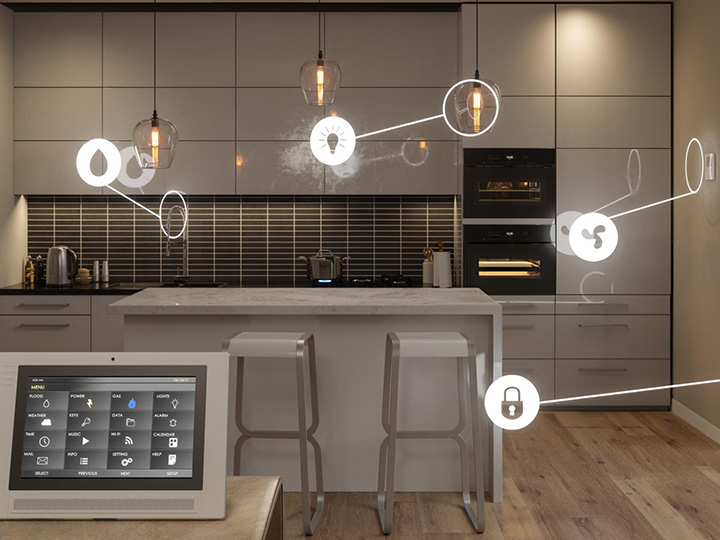
Design and Build Homes with Smart Technology Integration
The UK’s smart home market is on a steep rise, projected to grow by 19 million users to 34.79 million by 2028, marking a 120.33% increase. This trend highlights a shift towards intelligent, connected living spaces. Leading this transformation, Embury integrates advanced smart solutions into homes and businesses, reflecting the growing embrace of technology that makes our living environments more responsive, efficient, and secure.
Now, let’s dive into what truly defines a smart home.
What are Smart Homes?
Smart homes upgrade living spaces with automated technology. They manage appliances, lighting, climate, and more through the internet. Homeowners get control at their fingertips or with voice commands. This sophisticated ecosystem leverages devices connected via the internet, allowing homeowners to control their environment with a button or a simple voice command.
So, what are the benefits of embracing smart home technology?
- Intelligent systems optimising heating, cooling, and lighting based on usage and preferences significantly enhance energy efficiency.
- Convenience is another hallmark. With voice assistants and automated routines streamlining daily tasks.
- Security offers real-time surveillance, alerts, and remote controls that keep homeowners connected and reassured no matter where they are.
Thus, smart homes are more than places to live. They’re responsive environments, ready to meet your needs.
Here are the key benefits of using smart technology in your homes.
Blending IoT with Home Aesthetics
Integrating the Internet of Things (IoT) into home decor revolutionises how we perceive and interact with our living spaces. Once considered purely functional, IoT devices now enhance home aesthetics without sacrificing their primary purpose.
From smart lighting that can mimic the natural light cycle to thermostats that adjust the room temperature for optimal comfort and energy efficiency, these devices are designed to blend seamlessly with modern decor.
Even home appliances have received an intelligent makeover, with sleek designs that complement any interior design theme. The key is finding a balance where technology enhances living spaces without becoming obtrusive, ensuring your home remains a place of comfort and style.
AI: The Heart of Smart Home Efficiency and Ambiance
AI plays a pivotal role in transforming houses into smart homes. This intelligent personalisation contributes to energy efficiency by optimising utility use. It enhances the home environment, making spaces more responsive and adaptable to the inhabitants’ needs.
The integration of AI into home systems signifies a leap towards more intuitive living, where technology anticipates and caters to the subtle nuances of daily life.
Voice Assistants: The Cornerstone of Smart Home Interaction
Voice assistants and smart speakers stand at the core of the smart home ecosystem, offering unparalleled control and convenience. These devices allow the hands-free operation of virtually all smart home devices, from adjusting lighting control and playing music to setting alarms and ordering groceries.
The convenience of voice commands has redefined how we interact with our homes, making technology more accessible and integrating seamlessly into our daily routines. This voice-activated control is a testament to the evolving relationship between humans and their living spaces, where ease and efficiency take precedence.
Enhancing Home Security with Smart CCTV and Bells
Smart CCTV cameras and video doorbells have revolutionised home security, offering homeowners peace of mind with features like real-time surveillance, motion detection alerts, and remote access.
Integrating these security systems with mobile devices means you can monitor your home from anywhere, ensuring safety and security are always within reach. The benefits of these smart security solutions extend beyond mere monitoring; they deter potential intruders and provide valuable evidence should the need arise.
In smart homes, security systems are not just about protection; they’re about integrating safety into the fabric of our daily lives, seamlessly combining functionality with ease of use.
Conclusion
Integrating smart technology in homes has revolutionised how we live, seamlessly blending comfort, security, and efficiency.
By incorporating smart home ideas like energy-efficient appliances, lighting control, and advanced security systems, along with the convenience of voice assistants, you can design spaces that are not only modern but also sustainable and secure.
Ready to transform your living space? Contact Embury for a quote on smart home solutions and embrace the future of living today.
Frequently Asked Question
Smart homes face challenges like
High initial costs,
Complexity in installation and integration,
Privacy and security concerns due to Internet connectivity
Potential reliance on continuous internet access for optimal functionality.
Smart homes contribute to environmental preservation by optimising energy use, reducing waste through intelligent systems that control lighting, heating, and cooling, and leveraging renewable energy sources, leading to lower carbon footprints.
Smart homes are sustainable because they utilise energy-efficient appliances, employ automation to minimise electricity usage, and often incorporate eco-friendly materials and technologies, such as solar panels, to reduce environmental impact over time.

